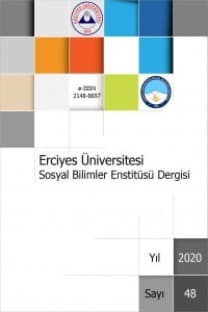Kentsel Yoksulluğun Genel Bir Değerlendirilmesi: Kırıkkale Örneği
Gelişmekte olan ülkelerin karşılaştığı toplumsal problemlerin başında hiç kuşkusuz yoksulluk gelmektedir. Yoksulluk; maddi nitelikteki mahrumiyetler nedeniyle asgari yaşam düzeyini sürdürecek gelirden yoksun bulunması halidir. Türkiye’de yoksulluğun daha çok doğu ve güney doğu bölgelerinde olduğu yaygın bir kanıdır. Oysa Ankara’ya 76 km. uzaklıktaki bir kentte yoksulluğun hangi boyutlarda olduğu yapılan anket çalışması ve yerinde yapılan gözlemlerle ortaya çıkarılmıştır. Bu çalışma ile Kırıkkale il merkezinde yaşayan yoksul ailelerin içinde bulundukları durum belirlenmeye çalışılmıştır. Bu amaçla, Kırıkkale il merkezinde faaliyette bulunan ve bir sivil toplum kuruluşu olan Beşinci Mevsim Yardım Derneği’nde kayıtlı olan yoksul ailelerle ilgili olarak bir çalışma yapılmıştır. Bu çerçevede bu aileler arasından gelişigüzel seçilen 400 aile oturdukları mahallelerde ziyaret edilmiştir. Yüz yüze yapılan bu görüşmelerde ailelere anket yoluyla demografik yapıları, konut durumları ve sosyal yardım alma durumları gibi onların sosyo-ekonomik durumlarını ortaya koyan 30 adet soru yöneltilmiştir. Anket sorularının güvenilirlik testleri için 50 ailede bu anket uygulanmış, daha sonra bu verilerin ışığında ankete son şekli verilerek 400 aile için yapılmıştır. Toplanan veriler, SPSS 13.0 programında düzenlenmiş ve frekans, yüzde, ki-kare, Pearson’s R testi, ortalama, korelasyon gibi farklı istatistiki metotlar uygulanmıştır. Çeşitli istatistiksel metotlar sonucunda ailelerin gelir düzeyi azaldıkça ailelerin gecekondularda oturma oranının artmakta olduğu ve gelir düzeyi azaldıkça ailelerin konut sahiplik durumunun azaldığı gibi önemli sonuçlar elde edilmiştir. Bu sonuçların ışığında yoksullukla ilgili olan tüm kamu kurum ve kuruluşları ve sivil toplum örgütlerine, yoksulluğun giderilmesine yönelik ve yardımların dağıtımı konusunda öneriler sunulmuştur
Anahtar Kelimeler:
Yoksulluk, Sosyal Yardım, Eğitim, Gelir Düzeyi, Gönüllü Kuruluşlar, Şehir, Gecekondu
AN OVERALL ANALYSIS OF URBAN POVERTY: THE CITY OF KIRIKKALE SAMPLE
It is a fact that poverty is one of the most serious problems of the developing countries. It can be defined as not to be able to attain the resources and production factors due to the financial difficulties. Therefore, the result is inevitably to live under the minimum living conditions with the limited possibilities at hand. Considering this fact, through this study we aimed to draw attention to the urban poverty, specifically the current position of poverty in Kırıkkale. There is a common belief that poverty takes place mostly in the eastern and southern east part of Turkey. However, as regard to poverty, the city of Kırıkkale, 76 km away from Ankara, is not completely different from those regions, and this fact has been proven with the findings obtained from this research specifically designed. The subject group for this study is the families chosen randomly from the list taken from Beşinci Mevsim Yardım Derneği which is a local charity association in Kırıkkale. For this reason, 400 families registered in Beşinci Mevsim Yardım Derneği have been visited and the scale designed for this study has been filled with the data gathered from the related families. Furthermore, the information obtained has also been checked with other resources such as neighbors and other official records. Throughout the research for this study, the subject group has been interviewed and requested to reply the 30 questions designed to find out the demographic situations, accommodation, public assistance and socio-economic situations. The data obtained from the questionnaire have been analyzed with the help of SPSS 13.0 programme. Various statistical techniques such as frequency, percentage, Chi-Square, Pearson’s R test, mean, correlation have been used. The results show that there is a significant correlation between the monthly income and the houses families live at. It has also been observed that families tend to live at slums when their income decreases, and thus the rate of owning houses gets lower. In the light of these results, it is suggested that all of the governmental and non-governmental organizations should work collaboratively so as to deliver the donations adequately and appropriately to the poor in urban
Keywords:
Poverty, Social Charity, Education, Non-Governmental Associations, Urban, Slum,
- Yayın Aralığı: Yılda 2 Sayı
- Yayıncı: Erciyes Üniversitesi
Sayıdaki Diğer Makaleler
Kentsel Yoksulluğun Genel Bir Değerlendirilmesi: Kırıkkale Örneği
Mustafa DURMUŞÇELEBİ, Dilek AKKAYA
Şerif Mardin’in Sosyal Değişim ve Kültürel Tartışmalarında Modernleşme, İletişim ve Dil Bağlantısı
Ali KORKMAZ, İbrahim E. BİLİCİ
Dilara GÖLGELİ, Sibel SARAÇOĞLU
Ulusal Güvenlik Kavramının Tarihsel ve Düşünsel Temelleri
Üniversite Öğrencilerinin Sorun Alanları ve Sorunlarla Başetme Yolları: Erciyes Üniversitesi Örneği
ŞERİF MARDİN’İN SOSYAL DEĞİŞİM VE KÜLTÜREL TARTIŞMALARINDA MODERNLEŞME, İLETİŞİM VE DİL BAĞLANTISI
Ali KORKMAZ, İbrahim E. BİLİCİ
Kuantum Fiziğinin Eğitim Bilimlerine Etkisi: Hologram ve Morfik Alanlar
Ulusötesi Şirketler ve Ulus Devlet: Güç Kayması Üzerine Bir Araştırma
